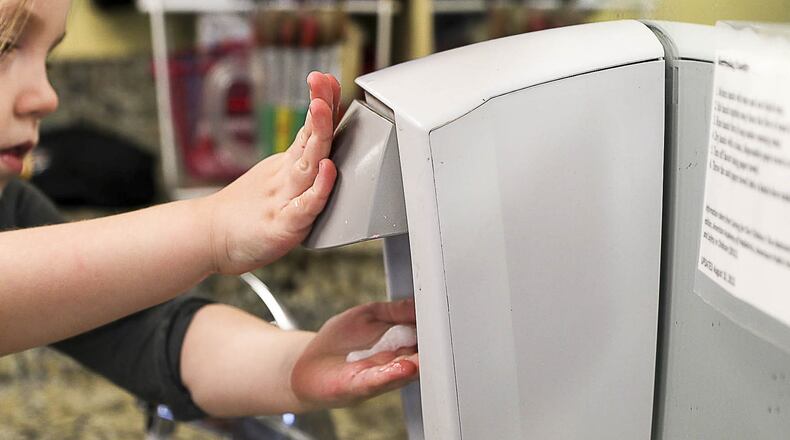With Christmas less than a week away, the leader of the state’s 1.2 million Catholics is asking parishioners to consider skipping services if they think they have the flu and says the church may take further steps, so grave are fears about another dangerous flu season.
Atlanta Archbishop Wilton D. Gregory said in a memo to priests and deacons that the situation will be monitored.
“We will be in touch immediately if it seems appropriate to take more significant steps, such as temporarily suspending Communion from the chalice or on the tongue,” he said.
The concerns are well-founded. Since flu season began in early October, the illness has killed four people in Georgia — three adults and a child — and there have been 159 hospitalizations in metro Atlanta due to flu symptoms.
“We’ve experienced high activity for the last three weeks,” said Audrey Kunkes, influenza surveillance coordinator for the Georgia Department of Public Health. “Last year was a very difficult influenza season. It’s too early to tell what this season will lead to. It’s tracking similar to what we saw last year.”
Georgia's 2017 flu season didn't actually subside until the end of April. It claimed 145 lives statewide and led to more than 3,000 hospitalizations in metro Atlanta. Local health officials called it the worst outbreak in decades. The previous year saw nine flu-related deaths in Georgia.
Relate: A nightmare flu season finally comes to an end
So far this season, H3N2, a form of influenza A, is more prevalent in Georgia. It is a more severe strain that can be particularly dangerous for the very young, the elderly and expectant mothers. The strain H1N1 is more prevalent nationally. It is too early to say which demographic group in Georgia has been most affected. It’s also hard to say why the state was so battered last year.
“I wish I knew,” said Kunkes, noting Georgia wasn’t unique. “We did experience a tremendously difficult year, but we were not alone in that. The whole country had a pretty bad year.”
Related: Tips to protect yourself from the flu
More: Many schools grappling with flu cases
In the most recent data set from the Weekly U.S. Influenza Surveillance Report, compiled by the Centers for Disease Control and Prevention, Georgia was the only state listed as experiencing high levels of influenza-like illness.
“Outbreaks occurring in a single city could cause the state to display high activity levels,” the report cautions. It goes on to qualify that the data “may disproportionally represent certain populations within a state, and therefore, may not accurately depict the full picture of influenza activity for the whole state.”
Georgia also was one of three states experiencing “widespread influenza activity,” along with California and Massachusetts. That data set “does not measure the severity of influenza activity,” the report says.
Hospitals and educators are taking precautions. All WellStar Health System employees must get flu shots, unless they have medical or other valid exceptions. Employees with signs of the flu are asked to stay home, and respiratory stations throughout each facility provide masks, gloves and hand sanitizer.
Officials at Long Cane Elementary in LaGrange have placed medical-grade hand sanitizer in every classroom and are requiring students to use it every morning after more than 50 students exhibited flu-like symptoms in recent weeks, Channel 2 Action News reported.
Metro area school districts urge sick employees to stay home and ask that parents keep their ill children at home. After Cobb County saw an increase in symptoms, administrators sent a flu shot reminder to parents and staff.
Kids R Kids child care center administrators have sent at least three reminders to parents in recent weeks about ways to keep their children healthy. The location on Barrett Parkway in Cobb County relies on its ZONO Cabinet, a machine that looks like a giant refrigerator, to keep little hands from spreading germs. The cabinet uses a solution to thoroughly clean items such as mats, paintbrushes, crayons and dolls.
On Tuesday morning, while the ZONO did its thing, six little girls lined up attentively — for the most part — for their ballet lesson. One tiny dancer rubbed her eyes and another scratched her nose before touching the floor as the teacher gave instructions.
Curriculum coordinator TaJuana Ray said their next move would take place at the sink. The most important routine her young charges can master these days, she says, is “hand-washing, hand-washing and hand-washing.”
Each year, 5 percent to 20 percent of the U.S. population gets the flu, tens of thousands are hospitalized and thousands die from flu-related illness. It costs an estimated $10.4 billion a year in direct medical expenses and an additional $16.3 billion in lost earnings annually, according to the CDC.
About half of Americans get annual flu shots. In recent years, flu vaccination rates have been on the rise, particularly among children, and now stand at about 60 percent for children and about 42 percent for adults.
Everyone can and should take preventative measures, Kunkes said. Wash your hands, stay away from people who are sick, stay home from school or work if you’re sick, and take all your medication if your doctor writes a prescription for you. Most importantly: Get the vaccine, she urged.
“When you get a flu shot, it’s not just for yourself,” she said, “it’s for your family.”
Keep Reading
The Latest
Featured



